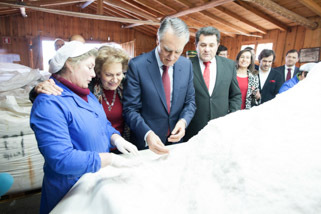
 |
|
The Council for Globalization, established under my sponsorship within the scope of COTEC-Portugal, meets today, in Sintra. Some twenty leaders of worldwide enterprises, from twelve countries – in Europe, Africa, North and South America, the Middle East and Asia -, together with a similar number of representatives of Portuguese companies with global ambitions, will debate the challenges of globalization. José Manuel Durão Barroso, President of the European Commission, will also be present at the meeting.
In a fast changing world, in which economies are ever more integrated and knowledge is a key factor for success, it is of great interest to reflect on how to promote a globalization that will be open to the participation of all countries, that is, a pluralistic globalization. This is the theme for this first meeting of the Council for Globalization.
In these days, enterprises are able to create competitive advantages through the integration of skills, capacities and market knowledge spread over the whole world. Following a globally integrated model, the several business components of enterprises can be achieved from any spot in the world. This is what is known as the meta-national advantage.
But, in a knowledge economy, globalization does not have to mean uniformity or standardization, through the imposition of a sole parameter. The world is far from flat and enterprises may gain advantages in the global market taking advantage of the differences between countries.
Globalization must be pluralistic, easing team work, in logic of interdependences and in an exchange of complementarities and fair competition, such that the winner of the procedure is humanity as a whole.
A globalization which is sensible means participation and not dominance.
Portugal can legitimately promote the debate over pluralistic globalization, since its universal expansion was more in terms of adaptation than of imposition, more in terms of integration than of uniformity.
Nowadays, the challenge for enterprises is Think Global and Act Global. In other words: supply global goods and services, conceived by global talents, based on global knowledge, for global markets.
Globalization means the growing mobility of goods, services, labour, ideas, technology and finance on a planetary scale. Although not a new phenomenon, globalization became intensified due to a concatenation of circumstances. On the one hand, the reduction of the barriers which conditioned international trade and investment, the economic changes brought into effect by China at the end of the seventies, the dissolution of the Eastern Bloc at the end of the eighties, and the economic reforms carried out in democratic India in the nineties.
These factors are enhanced, on the other hand, by the technological revolution occurred in information and communication, which drastically reduced the costs of producing, processing and carrying information. The world is now endowed with planetary communication infrastructures, accessible to any person, at any time, in any place. The geographic location of an enterprise is no further a determining cause.
The success of globalization means the expansion of the benefits of the revolution in information and communications, given its potential for improvements in such sectors as education and health, public services, enterprises and the media and in the access to information and knowledge.
In emerging countries, the opening up of markets and foreign investment has removed millions from poverty, opening windows of hope and establishing new visions of well being. Globalization reduced poverty, but demands policies which correct the phenomena of marginalization and of unemployment and invest in fairness and inclusiveness, even in the more developed countries.
The great challenge faced by Portugal is global competitiveness. Portuguese enterprises must be aware of the implications of the worldwide competitiveness in which the Portuguese economy is currently inserted, and take decisive advantage from the opportunities provided by this new reality. I am certain that the need to Think Global and Act Global must these days inspire both the strategic positioning of Portuguese enterprises and the basic references of our politicians, investors, social partners and Public Administration. If not, we risk being left behind.
It was this perspective that led me to propound establishing a Council for Globalization, to include national and foreign individualities and business leaders with knowledge and experience of the world economy. The aim is to contribute towards a better understanding of the globalization phenomenon and its many implications, create in Portuguese society a sense of urgency for the changes necessary to obtain success in a global world and muster energies for the erection of a higher platform of competitiveness; and, also, to endeavour establishing links between leaders of International and Portuguese enterprises, providing, at the same time, greater economic visibility for Portugal.
The Council for Globalization is an opportunity to provide us with better knowledge and understanding of the realities of a world in which the global economy is changing at an unprecedented rate, benefiting from the reflection and experience of worldwide business leaders with whom Portuguese entrepreneurs may tighten links and establish contacts. This is an opportunity that none amongst us, and, least of all, the President of the Republic, may ignore.
© 2006-2016 Presidency of the Portuguese Republic
You have gained access to the records of the Official Site of the Presidency of the Republic from 9 March 2006 to 9 March 2016.
The contents available here were entered in the site during the 10 year period covering the two mandates of President of the Republic Aníbal Cavaco Silva.